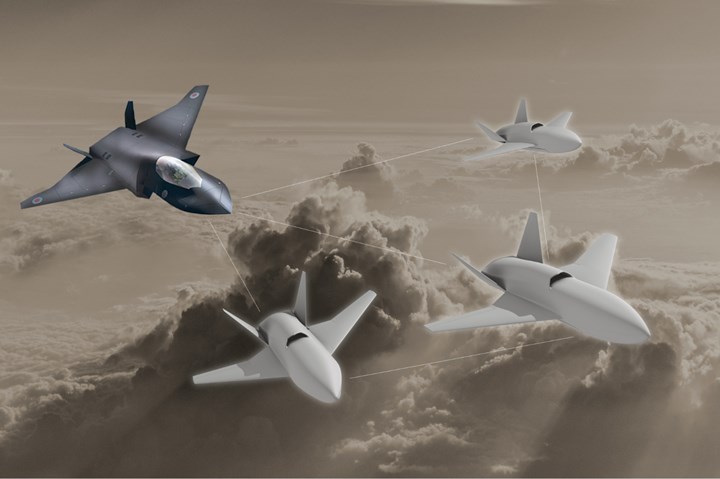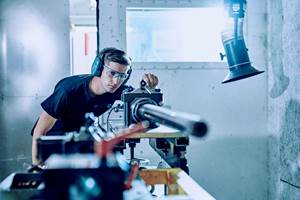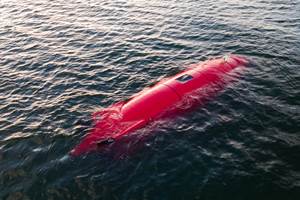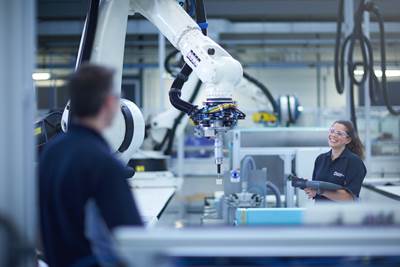NCC, Dstl facilitate R&D program for combat aircraft composite structures
The partnership invites organizations to pitch their most innovative ideas and capabilities to influence the direction of the ADCoSCA research program.

Photo Credit: NCC
The National Composites Centre (NCC, Bristol, U.K.) and the Defence Science and Technology Laboratory (Dstl, Salisbury, U.K.) have formed a partnership to explore next-generation combat aircraft composite structures through the Advanced Design of Composites Structures for Future Combat Aircraft (ADCoSCA) program. This will range from innovative approaches, overall structural layout, manufacturing and assembly, as well as the combination of detail features, and material selection.
Leading this through their joint steering group, the program will include a balance of intramural research at NCC, and extramural research, both of which the NCC and Dstl plan to have influenced by the community. The goal is to bring together people from academia, leading defense primes, SMEs and other parties outside of the traditional defense sector. Gearing opportunities such as matched funding and collaboration are also areas the steering group would like to explore.
The partnership kicks off with a competitive invitation to organizations to pitch their design and research ideas, which will determine the content of the project, and where and how aspects of it are undertaken. The steering group will then work with the community to develop and downselect these ideas into a coordinated series of funded research projects.
“We’re delighted to work closely with Dstl to increase the U.K.’s capabilities and innovation in the use of composites technologies for combat aircraft,” says Richard Oldfield, chief executive of the NCC. “As a world-leader in advanced composites design and manufacture, the NCC is uniquely placed to help enhance Dstl’s know-how for future combat aircraft composite structures. That’s why we are launching an open call for the most innovative ideas from a range of organizations so we can work together to equip our armed forces with the next generation resilient and efficient defense capabilities. This will play a crucial role in how the U.K. responds to the most complex challenges and threats to national security that our country may face.”
The two primary aims of the program are:
- To develop airframe design concepts through trades studies and worked examples.
- To systematically collate and develop the underpinning data upon which the airframe design trades are built, including the performance of composite materials and features, and to identify and mitigate those features that are constraining performance and cost.
Priority will be given to those transformational ideas that identify and mitigate existing limitations through design, such as through innovative structural layout at the platform and sub-assembly level; through detail features that permit increased operating strain; through design approaches that provide extreme levels of damage resistance and/or tolerance; and through design approaches that provide extreme levels of modularity, adaptability, and part-count reduction. All intellectual property owned by individual organizations will be protected and tracked with any engagements involving the steering group.
The first stage of the process is for organizations and interested parties to pitch their ideas and capabilities through an Expression of Interest. Chosen parties will then be invited to engage in further planning of the research program, and to submit formal bids for funding. If successful, funding will typically be awarded before the end of March 2021. Thus, interested parties have an opportunity to influence the work of program and the selection of those undertaking it, and potentially to undertake aspects of the program themselves.
Further information on the competition process and timetable is available on the NCC website. The steering group is holding a webinar on Wednesday Jan. 13, 2021, for anyone interested in applying to find out more and ask any questions. Those interested can sign up through the Eventbrite page.
Anyone with questions or who would like to sign up to receive updates about this program can email defence@nccuk.com.
Related Content
Airbus presents unmanned Wingman concept
Fighter jet model unveiled at ILA Berlin, made from an iron structure and composite outer skin, will deliver more tactical options, supporting future combat missions.
Read MoreTenCate Advanced Armour renamed to Integris Composites
With its rebranding, Integris maintains the ability to develop, test and manufacture ballistic armor and survivability solutions while expanding into new markets where composite solutions can be advantageous.
Read MoreLarge-format 3D printing enables toolless, rapid production for AUVs
Dive Technologies started by 3D printing prototypes of its composite autonomous underwater vehicles, but AM became the solution for customizable, toolless production.
Read MoreMATECH C/ZrOC composite is deployed in hypersonic aeroshells
Ultra high-temperature insulating CMC targets hypersonics, space heat shields and other demanding applications, tested up to 2760°C under extreme stagnation pressures.
Read MoreRead Next
Innovate UK grants NCC £355k to help achieve net zero future
Funding will investigate how composite materials can best be used in final products, mitigation of their environmental impact and overall sustainability.
Read MoreDeveloping bonded composite repair for ships, offshore units
Bureau Veritas and industry partners issue guidelines and pave the way for certification via StrengthBond Offshore project.
Read MoreAll-recycled, needle-punched nonwoven CFRP slashes carbon footprint of Formula 2 seat
Dallara and Tenowo collaborate to produce a race-ready Formula 2 seat using recycled carbon fiber, reducing CO2 emissions by 97.5% compared to virgin materials.
Read More
























